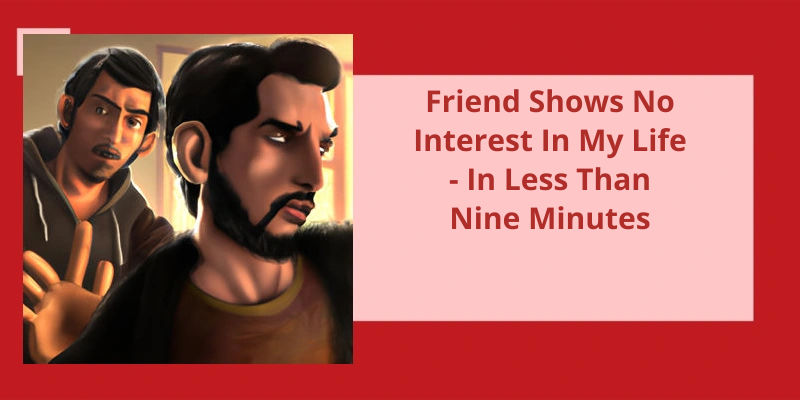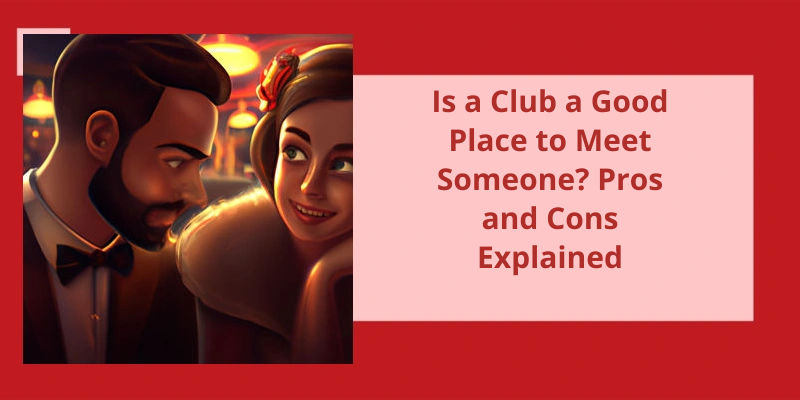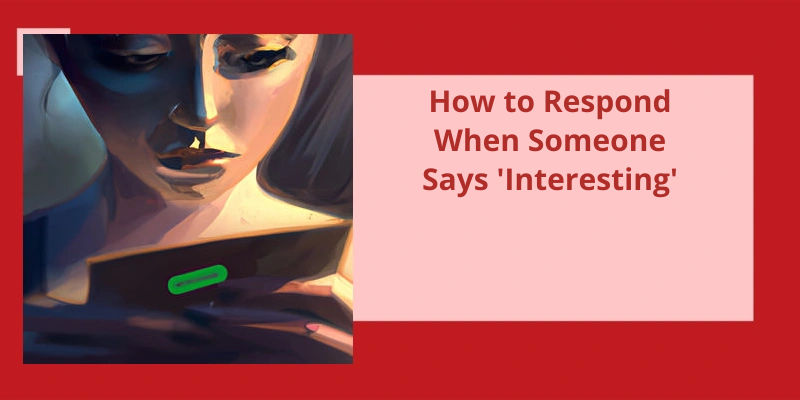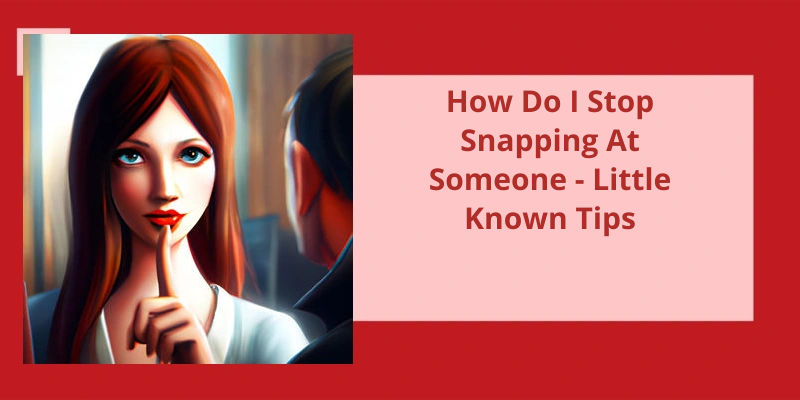It’s a universal truth that friendships are a vital component of our lives, bringing joy, support, and connection. However, sometimes we encounter a perplexing and disheartening situation: when a close friend seems to exhibit a complete lack of interest in our life. This inexplicable disinterest can be particularly disconcerting, leaving us feeling unimportant and undervalued. In a world where genuine connections are cherished, it raises questions about the authenticity and depth of the friendship. How can one truly be a friend if they show no genuine curiosity about the experiences, triumphs, and challenges that shape our lives? This article explores the emotional repercussions and potential causes of such a distressing phenomenon, aiming to shed light on this disheartening situation in less than nine minutes.
What to Do When a Friend Doesn T Make Time for You?
When you find yourself in a situation where a friend shows no interest in your life, it can be hurtful and disappointing. It’s natural to want someone who cares about you and wants to be involved in your life. However, it’s important to recognize that not all friendships are meant to last forever. Sometimes people change, priorities shift, or they simply lose interest in maintaining a connection.
If it becomes evident that your friend is consistently not making time for you and doesn’t show any genuine interest in your life, it may be time to move on. It can be difficult, but holding onto a one-sided friendship can be emotionally exhausting and ultimately unsatisfying. Consider talking to a close friend or even a professional counselor to gain a second or third opinion on the situation. They can offer valuable insights and help you see whether it’s worth continuing to invest in the friendship.
Remember that friendships should be a two-way street, where both parties make an effort to stay connected and emotionally involved. If your efforts are consistently met with disinterest or disregard, it may be a sign that the friendship has run it’s course. It’s important to recognize your own worth and not settle for a friendship that isn’t fulfilling or reciprocal.
Moving on may be challenging, as letting go of a friendship can bring about a range of emotions such as sadness, anger, or even guilt. However, prioritizing your own well-being and surrounding yourself with people who lift you up is crucial. Invest your time and energy in people who show genuine interest in your life and make you feel valued and supported.
In the process of moving on, it can be helpful to seek out new social opportunities. Join clubs, organizations, or engage in activities where you can meet new people and potentially develop new friendships. Sometimes, letting go of one friendship can open up the door to new and more meaningful connections.
Remember, relationships and friendships evolve over time. It’s natural to outgrow some friendships and create space for new ones to flourish. Focus on nurturing the relationships where mutual interest and support exist, and find solace in the fact that the end of one friendship can pave the way for new beginnings.
How to Communicate Your Feelings to Your Friend When They Don’t Make Time for You.
If you’ve a friend who seems disinterested in your life and doesn’t make time for you, it’s important to communicate your feelings to them. Start by finding a good time and place to have an open and honest conversation. Express your concerns calmly and clearly, focusing on how their lack of interest makes you feel. Use “I” statements to avoid sounding accusatory. Give them a chance to explain their behavior, as there may be underlying reasons for their actions. Remember to listen actively and empathetically to their perspective. Together, you can work towards finding a solution that improves your friendship and ensures both of your needs are met.
Why Is My Friend Not Making Time for Me?
They may not be intentionally ignoring or neglecting you, but rather dealing with personal challenges that require their undivided attention. It’s important to be patient and understanding during these times, as your friend may not have the capacity to invest in the friendship as much as they normally would. Offer your support and let them know that youre there for them whenever theyre ready to reconnect.
Additionally, it’s possible that your friends priorities have shifted. People change and evolve, and their interests and commitments can vary over time. It’s essential to recognize that friendships ebb and flow, and sometimes people may naturally drift apart due to differing priorities. It doesn’t mean that your friend no longer cares about you, but rather that their focus is currently elsewhere.
Communication is key in any relationship, so if you feel neglected by your friend, it’s important to have an open and honest conversation about how youre feeling. Express your concerns and emotions calmly and respectfully, allowing your friend the opportunity to share their perspective as well. This dialogue can help you both gain a deeper understanding of each others situations and find a compromise that works for both of you.
It’s also essential to reflect on your own expectations and demands within the friendship. Are you being overly demanding or clingy? Are your own needs overshadowing those of your friend? Sometimes, we unintentionally put pressure on our friends to fulfill certain roles or meet specific expectations, which can strain the relationship. Take a step back and assess whether your own behavior might be contributing to the disconnect between you and your friend.
Lastly, it’s important to nurture other relationships and invest in yourself during this time. While it’s natural to feel hurt or disappointed when a friend seems disinterested, it’s crucial not to solely rely on one person for emotional fulfillment. Cultivate a support network and engage in activities that bring you joy and fulfillment. By doing so, youll not only lessen the impact of your friends disengagement but also foster personal growth and resilience.
Source: My best friend doesn’t have time for me anymore
It’s essential to approach the situation with understanding and empathy, reminding yourself that people go through ups and downs, and it’s not always a reflection of your worth or value as a friend. Taking a moment to give yourself a pep talk can help you maintain a positive mindset as you navigate this situation. Remember, communication and patience are key when dealing with friends who may seem disinterested.
How Do You Deal With a Friend Who Is Not Interested in You?
They could be going through a difficult time and are unable to fully invest in their friendships at the moment. Remind yourself that their lack of interest doesn’t define your worth. You’re an incredible person with unique qualities and interests. Be proud of who you’re and the things you bring to the table as a friend.
Instead of dwelling on their disinterest, focus on nurturing your own self-worth and happiness. Take this opportunity to rediscover yourself and explore new hobbies or interests that bring you joy. Surround yourself with positive influences and supportive friends who appreciate you for who you are.
When it comes to addressing the situation with your friend, approach it with empathy and understanding. Rather than accusing or blaming them, try having an open and honest conversation. Express how youve been feeling and ask if everything is okay on their end. Give them the opportunity to share their perspective and let them know that youre there to support them if needed.
However, if your friend continues to show no interest in your life after youve had a conversation, it might be time to reevaluate the friendship. Friendship should be a two-way street, where both parties invest time and effort into nurturing the relationship. It’s important to have people in your life who reciprocate the same level of interest and care.
Remember that you deserve friends who value you and are genuinely interested in your life. Surround yourself with individuals who celebrate your accomplishments, listen to your dreams, and support you through the ups and downs. Sometimes, letting go of a friendship that no longer serves you is the best thing you can do for your own well-being. Focus on cultivating relationships that bring positivity and fulfillment into your life.
Recognizing Signs of Disinterest in a Friendship
Recognizing signs of disinterest in a friendship can be disheartening, but it’s important to be aware of them. Some common signs include your friend consistently canceling plans, not actively engaging in conversations, or not showing interest in your life. If you notice these patterns, it may be time to reassess the friendship and consider whether it’s mutually fulfilling. Communication is crucial, so try discussing your concerns with your friend to clarify the situation and address any underlying issues.
It’s important to recognize that not all individuals thrive on social interaction and finding genuine interest in friendships. While some may find joy in maintaining a large circle of friends, others may feel perfectly content with a smaller social circle or even prefer solitude. Each person’s needs and preferences differ, and it’s completely normal to not be interested in friends or socializing as much as others. Embracing and honoring one’s own inclinations is essential for personal well-being and happiness.
Is It Normal to Not Be Interested in Friends?
Is it normal to not be interested in friends? It’s perfectly natural to go through phases where your interest in friendships wanes. In fact, most friendships dissipate through time as people evolve and their interests diverge. It’s a normal part of lifes ever-changing dynamics. If you find yourself feeling disinterested or disconnected from your friends, it may be a sign that your interests have digressed and your friendships are no longer as stimulating or fulfilling as they once were.
Continuing a friendship solely out of obligation or habit can lead to a sense of stagnation and even resentment. It’s better to acknowledge when the common ground has diminished and honestly assess whether staying in these friendships brings you joy or only a sense of monotony. You deserve to surround yourself with individuals who engage and uplift you.
It’s important to remember that friendships, like any other relationship, require effort and mutual interest to thrive. If you feel consistently uninterested in your friends lives or find yourself getting bored to death during conversations, it may be worth evaluating whether these relationships are still reciprocal and beneficial to both parties involved. It’s not selfish to prioritize your own happiness and personal growth by seeking out connections that align with your current interests and aspirations.
In some cases, open communication with your friends might help reignite the spark in your relationships. Share your concerns and desires for change, and see if theres a possibility to rediscover common interests or engage in activities that can revive the connection. However, if your efforts go unnoticed or are met with disinterest, it may be a sign that it’s time to gracefully let go and seek new connections that align more closely with your current life circumstances.
Remember, friendships should be a source of joy, support, and meaningful interaction. If they no longer provide these benefits, it’s okay to move on and find new companionship. Ultimately, nurturing relationships that align with your interests and bring out the best in you’ll foster a sense of fulfillment and happiness in your life.
The Importance of Setting Boundaries in Friendships to Prevent Disinterest
- Setting boundaries in friendships helps maintain a healthy balance.
- It prevents disinterest from creeping into the relationship.
- Boundaries allow individuals to prioritize their needs and well-being.
- They establish clear expectations and prevent misunderstandings.
- Setting boundaries shows respect for personal space and time.
- It helps prevent feelings of being taken for granted or used.
- Having boundaries allows individuals to express their preferences openly.
- It fosters a sense of independence and self-worth in friendships.
- Boundaries can protect against emotional exhaustion or burnout.
- Clear boundaries promote healthier communication and problem-solving.
It can be tough when you realize that someone you considered a friend isn’t interested in maintaining that relationship. However, it’s important to remember that not everybody is meant to be in our lives forever. In these situations, it’s crucial to take time to process your feelings and allow yourself to heal. While it may be difficult, avoiding contact with the person for a while can help provide some emotional distance. Additionally, letting go of any memories tied to that person can assist in moving forward. Focus on working on yourself, practicing self-love, and investing in relationships with people who value and appreciate your friendship.
What to Do When Your Friend Is Not Interested in You?
If you find yourself in a situation where your friend shows no interest in your life, it can be disheartening and hurtful. It’s important to take the time to process your feelings and understand that not everyone can be your friend forever. People come and go in our lives, and sometimes friendships fade away naturally.
One of the ways to deal with this is by avoiding contact with the person who shows no interest in your life. It might be tempting to try and force a connection or constantly reach out to them, but it’s essential to respect their boundaries and give yourself the space you need. By distancing yourself, you can focus on nurturing relationships with people who do appreciate you and are genuinely interested in your life.
To help move on from this friendship, it can be helpful to get rid of all the memories related to the person. This doesn’t mean you’ve to throw away everything that reminds you of them, but it can be beneficial to create some distance by storing these items away for a while. This will allow you to create a fresh start and avoid constant reminders of the person who showed no interest in your life.
While going through this process, it’s important to work on yourself and practice self-love. Remember that your worth isn’t determined by whether or not someone wants to be your friend. Focus on your own growth, hobbies, and passions. Surround yourself with people who value and support you, and invest time in activities that bring you joy and fulfillment.
Lastly, it’s important to remember that this situation isn’t a reflection of your worth or likability. People have various reasons for not showing interest in someones life, and it often has more to do with their own issues rather than something youve done wrong. Dont internalize the rejection or let it affect your self-esteem. Instead, use this experience as an opportunity for personal growth and to find friends who genuinely appreciate you for who you are.
How to Have a Conversation With Your Friend About Their Lack of Interest
Having a conversation with your friend about their lack of interest in your life can be challenging, but it’s important to address your feelings and concerns. Start by choosing the right time and place to talk, where you both feel comfortable and can have a private discussion.
Express your feelings calmly and honestly, using “I” statements to avoid sounding accusatory. For example, instead of saying “You never seem interested in what’s going on with me,” say “I feel like you haven’t been as interested in my life lately and it makes me sad.”
Give specific examples to illustrate your point and show that this is an ongoing issue. This way, your friend can understand the impact of their behavior on your relationship.
Be open to hearing their perspective and try to understand why they may have been less engaged. It’s possible that they may have their own struggles or issues that have caused them to be preoccupied.
Lastly, suggest possible solutions or changes that could improve your friendship. This could include setting aside dedicated time to catch up, sharing more about each other’s lives, or finding common interests to bond over.
Remember, communication is key in any healthy relationship. By addressing your concerns in a respectful and understanding manner, you increase the chances of finding a resolution and strengthening your friendship.
Conclusion
In conclusion, it’s disheartening to experience a friendship in which one's friend shows no interest in their life in such a short period of time. This lack of interest not only creates a sense of loneliness and invalidation, but also highlights the importance of reciprocal engagement and genuine empathy in any relationship. While relationships may evolve or fade over time, it’s crucial for individuals to actively demonstrate interest in each other's lives, fostering a deeper connection and a sense of mutual support. Developing and maintaining friendships that prioritize genuine care and attention is essential for emotional well-being and the growth of meaningful connections.






